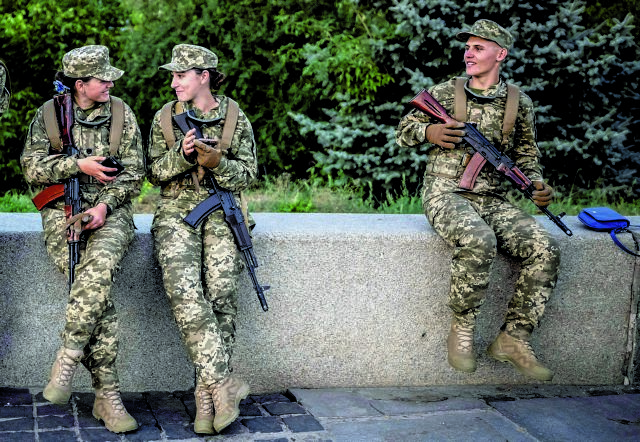
The specter of the Cold War has emerged in the political debate over Ukraine’s future: the fear that the country could be divided, as happened on the Korean peninsula.
The stalemate on the front lines, where neither side seems able to shift the balance, is raising more and more political and academic voices pointing to the possibility that a cessation of hostilities could lead to two conflicting realities, as happened with North and South Korea: a free Ukraine integrated into The Western Bloc and the de facto annexation of Ukraine to Russia.
The end of World War II led to the division of the Korean Peninsula, which until then had been under Japanese colonial rule.
The northern part of the famous 38th parallel was placed under the control of the Commissariat of the Soviet Union and the southern part under the control of the United States of America.
After failed attempts at reunification, two new states were declared in 1948, communist Korea and US-allied Korea. North Korea invaded the South in 1950, sparking the Korean War.
In 1953, a truce was signed between the two sides without reaching a peace agreement. And so things continue to this day.
The Korean scenario was always on the table, in theory, in the Ukrainian crisis.
However, the fear of dividing Ukraine began to take clear shape this year.
“We were offered the Korean option. Here there are Ukrainians, there are other Ukrainians, and there are no Ukrainians. I am convinced that one of the alternatives that will be proposed to us is the 38th parallel.”
The country could end up in a “two Koreas scenario,” as Oleksiy Aristovich, a former adviser to Ukrainian President Volodymyr Zelensky, wrote a month later. He added: “The worst thing is that this is the way the West thinks, and we are completely dependent on them.”
Danilov and Aristovich – El Pais reports – made these statements before the Ukrainian counteroffensive began in June, raising expectations of success that proved to be exaggerated.
Russia still controls 18% of Ukraine, the same percentage it controlled last November, when half of Kherson Province was liberated. Zelensky and the Ukrainian armed forces are demanding more time and asking for support for a war that will drag on for years, but as the Ukrainian president himself has acknowledged, not all of Kiev’s partners are willing to do so.
“I have this intuition, I read and listen and look into their eyes when they say: We will always be with you,” Zelensky said in a recent interview with The Economist. “And I see that he is no longer here, and he is no longer with us.”
The recent dispute between Ukraine and Poland, one of its strongest supporters in the war, over extending the ban on the import of Ukrainian grain, has underscored how fragile these alliances are.
At the recent annual conference of the Yalta European Strategy Group held in Kiev, a bleak report on Ukraine 2040 was presented.
The document prepared by Ukrainian politicians describes four scenarios for the future. Scenario 1: Russian hegemony could lead to a world war if the country that invaded Ukraine decides to attack other Black Sea countries. Second scenario: After forcing Ukraine to enter into a truce and cede territory, popular anger ends up bringing extreme nationalist groups to power that turn the country into an authoritarian state. Third scenario: fragmentation of Ukraine into several autonomous regions. The fourth scenario, the only positive one: Ukraine wins the war and expels the Russians from its lands.
The Korean alternative will form part of the second scenario, which foresees a serious risk of a decline in democracy in Ukraine.
However, some academics believe it could be the lesser evil. Among the main advocates of this position is the American historian Stephen Kotkin, a researcher at Stanford University and the Hoover Institution, who believes that the time has come for “Ukraine to win not a war, but a sustainable peace.”
“South Korea does not own all the territory, but it enjoys security after the armistice,” he explained at a conference in July. “It is an imperfect solution, it has left many families separated, but South Korea is one of the most prosperous countries in the world.
He added that Ukraine could follow this path, considering it a “victory” for the country with its membership in the European Union and a new security model, either within NATO or through a defense agreement similar to the one that South Korea concluded with the United States.
However, analysts who agree with this point of view point out that the only way to achieve future peace negotiations is, precisely, through long-term military support for Kiev by its partners: it is, as Carter Malkashyan, a former Kiev official said. Adviser to the US Military Staff, “The only way for Ukraine to maintain its position and some pressure on Russia.”
source TA NEA Print Edition

“Hipster-friendly coffee fanatic. Subtly charming bacon advocate. Friend of animals everywhere.”





More Stories
F-16 crashes in Ukraine – pilot dies due to his own error
Namibia plans to kill more than 700 wild animals to feed starving population
Endurance test for EU-Turkey relations and Ankara with Greece and Cyprus